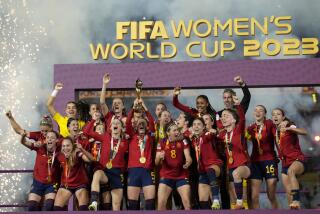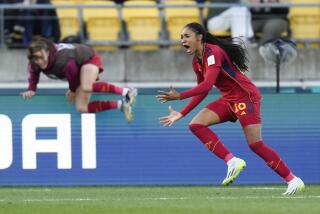Spain’s World Cup win wasn’t pretty, but wipes away its frustration
- Share via
Johannesburg, South Africa — An evening that began with fireworks ended in tears of joy for Spain, which erased decades of frustration Sunday by finally hoisting the World Cup trophy.
Andres Iniesta’s goal 28 minutes into extra time, mixed with a spectacular game from keeper Iker Casillas, gave La Furia Roja an ugly but hard-fought 1-0 win over a shorthanded Netherlands squad before a raucous, vuvuzela-tooting crowd of 84,490 at Soccer City Stadium.
It was the third time in the last five World Cups that the final went into extra time. The earlier two were decided by penalty kicks.
Iniesta’s goal – which came when he batted a loose ball out of the air in the penalty area -- made that unnecessary. And by claiming the most cherished prize in sports two years after winning the European Championship, Spain may have finally quieted critics who have long said it can’t win the big one.
An estimated 700 million people watched on television as Spain became just the eighth country to win the World Cup, with the broadcast reaching every country on the globe. That’s 100 million more than watched the opening ceremonies from the 2008 Beijing Olympics.
But while it must have been pleasing for Spain to win, it wasn’t pleasing to watch them do it with referee Howard Webb being forced to issue 14 yellow cards and one red card, with Dutch defender John Heitinga getting off early in the second 15-minute extra period.
The festivities began with an elaborate, star-studded closing ceremony that included a brief appearance by former South African President Nelson Mandela – who received a standing ovation. But viewers who expected that to be followed by an entertaining fast-paced match between two teams must have been disappointed.
It wasn’t supposed to be that way. A day earlier Spanish Coach Vicente Del Bosque predicted the game would be an advertisement for artful soccer. Instead it gave soccer – artful and otherwise -- a black eye.
This match was more like an ad for professional wrestling.
Spain came into the final with an impressive resume, having won 30 of its 32 games under Del Bosque, who took over the team after Spain’s victory in the 2008 European Championships.
But the Netherlands had done even better, winning its first six World Cup matches to run their unbeaten streak to 25 games dating back nearly two years.
And recent skeins of success weren’t the only thing the two sides had in common, though. Both normally practice an identical ball-control style of play that relies heavily on the skills of their midfielders. And it was in the midfield that much of Sunday’s final was contested – though not always as expected, with both teams engaging in some uncharacteristically rough play.
In the eighth all-European final -- but the first such final outside Europe -- both teams were aggressive from the start. Maybe too aggressive, with Webb, struggling to get control of the match, handing out five yellow cards in the opening 28 minutes, with three going to unusually thuggish Dutch.
The teams didn’t combine for that many shots on goal in the first half. And Webb never did get control of the game as both teams continued to embarrass international soccer’s top official with their play.
Spain, which had a wide advantage in ball possession in the opening half, also had the first good scoring opportunity when a Sergio Ramos header off a free kick appeared headed for the corner of the goal in the fifth minute. But Stekelenburg, diving to his right, managed to get a hand on it.
Two minutes later it was Holland’s turn with Dirk Kuyt taking advantage of some rare poor passing on Spain’s part to get off a 25-yard shot that proved an easy save for Iker Casillas.
What followed was a lot of pushing and shoving before the scoreless first half came to a close with the Dutch enjoying their first prolonged attack of the night, one that ended with Arjen Robben’s left-footed shot from the edge of the penalty area curling into Casillas’ arms at the near post.
The Dutch started the second half a little more interested in playing soccer, with their midfielders doing a much better job of maintaining possession. As a result, Holland mounted a couple of quick rushes into the Spanish end in the first 10 minutes.
But it also collected two more yellow cards and the fans in the stadium began to whistle their displeasure over the fact that a game expected to be a showcase of tactical soccer was on the verge of becoming a street brawl.
There was still room for artful efforts, though, the first of which came in the 62nd minute when Casillas made a brilliant save on Robben.
The Dutch striker caught the Spanish defense pinching up toward midfield. And when a lead pass drew him clear of the pack, he came in alone on the keeper. Casillas charged out of the goal to meet him about 10 yards from a net and used his foot to make a stop on what looked to be a sure goal.
Casillas rushed out of the net again in the 83nd minute to stop another breakaway by Robben, who ended up on the ground after the rough stop. The Dutch star chased Webb back up the field screaming in protest, earning a yellow card – Holland’s sixth of the match -- for his trouble.
With the game still scoreless, Spain’s best second-half chance came in the 69th minute when Villa collected a loose ball on the doorstep of the Dutch goal. But he booted his shot wildly over the goal.
Four minutes later Villa mis-hit a free kick, sending it over the net as well.
Spain had a chance to go ahead five minutes into extra time but Cesc Fabregas was robbed on a breakaway by Dutch keeper Stekelenburg. And moments after that Holland missed a chance to score the first goal when Joris Mathlisen’s header went over the crossbar.
More to Read
Go beyond the scoreboard
Get the latest on L.A.'s teams in the daily Sports Report newsletter.
You may occasionally receive promotional content from the Los Angeles Times.







